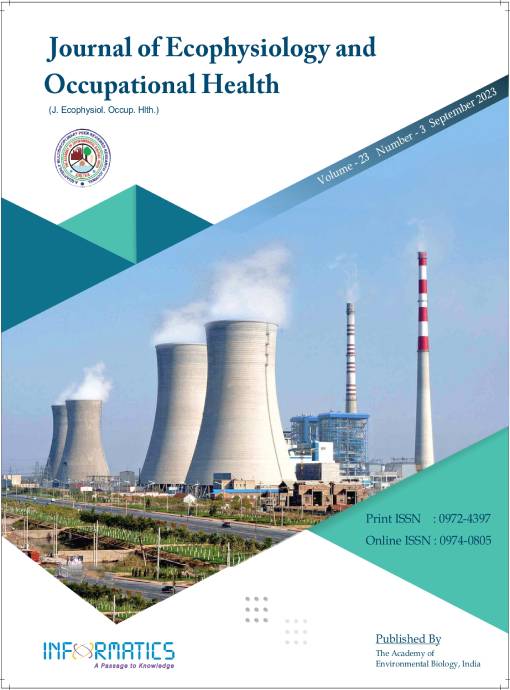Emotional Intelligence and Aggression in Adolescents: A Review
DOI:
https://doi.org/10.18311/jeoh/2023/34108Keywords:
Adolescents, Aggression, Emotional Intelligence, Mental HealthAbstract
Several studies have demonstrated that young individuals possessing elevated emotional intelligence exhibit a higher inclination toward engaging in aggressive behaviour. This study brings attention to various aspects of the connection between aggressive behaviour and emotional intelligence. The findings might be used to develop courses on emotional intelligence and self-regulation to reduce aggressive behaviour among adolescents. Data considered for the study is from the published research article between 2000 and 2022 in various journals. Some of the electronic databases indexing the word related to the topic were used to narrow our search for relevant publications for this review. These findings indicate that a person’s level of hostility is negatively correlated with their ability to evaluate. This relation stays true across various variables, including cultures, forms of violence, and emotional intelligence tests administered at different ages. These findings also provided a foundation for discussing and recommending more studies on emotional intelligence strategies for managing and preventing aggressiveness. Important research subjects in adolescent mental health include anger ruminations, emotional regulation training, relaxation therapy, psychological treatments, and coping strategies. Both parents and children may take steps to improve their mental health.
Downloads
Metrics
Downloads
Published
How to Cite
Issue
Section
License
Copyright (c) 2023 Jintu Reji, S. Muhammed Mubeez, V. Naveen, Vinod Kumar, N. Rajkumar

This work is licensed under a Creative Commons Attribution 4.0 International License.
Accepted 2023-08-01
Published 2023-09-19
References
Maleki M, Liaghatdar MJ, Nili MR. Phenomenological study of determining the basic skills of work and technology curriculum. The Technology of Education Journal (TEJ). 2020; 14(2):369-81.
Gómez-Leal R, Megías-Robles A, Gutiérrez-Cobo MJ, Cabello R, Fernandez-Berrocal P. Personal risk and protective factors involved in aggressive behaviour. Journal of Interpersonal Violence. 2022; 37(3-4):NP1489-515. https://doi. org/10.1177/0886260520926322 PMid:32529937 DOI: https://doi.org/10.1177/0886260520926322
Orue I, Calvete E, Fernández-González L. Early maladaptive schemas and social information processing in child-to-parent aggression. Journal of Interpersonal Violence. 2021; 36(15-16):6931-55. https://doi.org/10.1177/0886260519831395 PMid:30795707 DOI: https://doi.org/10.1177/0886260519831395
Murphy KR, editors. A critique of emotional intelligence: What are the problems and how can they be fixed? Psychology Press; 2014.
Zeidner M, Matthews G, Roberts RD. What we know about emotional intelligence: How it affects learning, work, relationships, and our mental health. MIT Press; 2012.
Siegling AB, Saklofske DH, Petrides KV. Measures of ability and trait emotional intelligence. Measures of Personality and Social Psychological Constructs. 2015; 381-414. https://doi. org/10.1016/B978-0-12-386915-9.00014-0 DOI: https://doi.org/10.1016/B978-0-12-386915-9.00014-0
Gupta R, Bajaj B. Emotional intelligence: Exploring the road beyond personality and cognitive intelligence. Pertanika Journal of Social Sciences and Humanities. 2018; 26(3):1227-39.
Dahl G, DellaVigna S. Does movie violence increase violent crime? The Quarterly Journal of Economics. 2009; 124(2):677- 734. https://doi.org/10.1162/qjec.2009.124.2.677 DOI: https://doi.org/10.1162/qjec.2009.124.2.677
Estévez E, Jiménez T, Segura L. Emotional intelligence and empathy in aggressors and victims of school violence. Journal of Educational Psychology. 2019; 111(3):488. https://doi. org/10.1037/edu0000292 DOI: https://doi.org/10.1037/edu0000292
Bibi A, Saleem A, Khalid MA, Shafique N. Emotional intelligence and aggression among university students of Pakistan: A correlational study. Journal of Aggression, Maltreatment and Trauma. 2020; 29(10):1189-203. https://doi.org/10.1080/10926771.2019.1 709592 DOI: https://doi.org/10.1080/10926771.2019.1709592
Megias A, Gómez-Leal R, Gutiérrez-Cobo MJ, Cabello R, Fernández-Berrocal P. The relationship between aggression and ability emotional intelligence: The role of negative affect. Psychiatry research. 2018; 270:1074-81. https://doi. org/10.1016/j.psychres.2018.05.027 PMid:30001802 DOI: https://doi.org/10.1016/j.psychres.2018.05.027
Fayaz I. Aggression and emotional intelligence among adolescent boys of Kashmir. Asian Journal of Multidimensional Research (AJMR). 2019; 8(2):249-56. https://doi.org/10.5958/2278- 4853.2019.00052.1 DOI: https://doi.org/10.5958/2278-4853.2019.00052.1
Salguero JM, Fernández-Berrocal P, Balluerka N, Aritzeta A. Measuring perceived emotional intelligence in the adolescent population: Psychometric properties of the Trait Meta-Mood Scale. Social Behavior and Personality: An International Journal. 2010; 38(9):1197-209. https://doi.org/10.2224/ sbp.2010.38.9.1197 DOI: https://doi.org/10.2224/sbp.2010.38.9.1197
Harris JA. A further evaluation of the Aggression Questionnaire: Issues of validity and reliability. Behaviour Research and Therapy. 1997; 35(11):1047-53. https://doi.org/10.1016/S0005- 7967(97)00064-8 PMid:9431736 DOI: https://doi.org/10.1016/S0005-7967(97)00064-8
Vega A, Cabello R, Megias-Robles A, Gomez-Leal R, Fernandez- Berrocal P. Emotional intelligence and aggressive behaviours in adolescents: A systematic review and meta-analysis. Trauma, Violence, and Abuse. 2022; 23(4):1173-83. https://doi. org/10.1177/1524838021991296 PMid:33568015 DOI: https://doi.org/10.1177/1524838021991296
Mursaleen M, Munaf S. Differences of emotional intelligence, aggression, and academic achievement among students with different levels of intellectual ability. Bahria Journal of Professional Psychology. 2020; 19(2):48-60.
Inglés CJ, Torregrosa MS, García-Fernández JM, Martínez- Monteagudo MC, Estévez E, Delgado B. Aggressive behaviour and emotional intelligence in adolescence. European Journal of Education and Psychology. 2015; 7(1):29–41. https://doi. org/10.30552/ejep.v7i1.97 DOI: https://doi.org/10.30552/ejep.v7i1.97
Jaleel S, Verghis AM. Comparison between emotional intelligence and aggression among student teachers at the secondary level. Universal Journal of Educational Research. 2017; 5(1):137- 40. https://doi.org/10.13189/ujer.2017.050117 DOI: https://doi.org/10.13189/ujer.2017.050117
Malinauskas R, Malinauskiene V. The relationship between emotional intelligence and psychological well-being among male university students: The mediating role of perceived social support and perceived stress. International journal of environmental research and public health. 2020; 17(5):1605. https:// doi.org/10.3390/ijerph17051605 PMid:32131478 PMCid: PMC7084724 DOI: https://doi.org/10.3390/ijerph17051605
Ireland JL, Lewis M, Ireland CA, Derefaka G, Taylor L, McBoyle J, Archer J. Self-reported psychopathy and aggression motivation: A role for emotions? The Journal of Forensic Psychiatry and Psychology. 2020; 31(1):156-81. https://doi.org/10.1080/1478994 9.2019.1705376 DOI: https://doi.org/10.1080/14789949.2019.1705376
Mambra K, Jaleel A. Role of emotional intelligence on aggression among college students. International Journal of Innovative Research in Technology. 2022; 8(2):734-8.
Barry MM, Clarke AM, Dowling K. Promoting social and emotional well-being in schools. Health Education. 2017; 117(5):434-51. https://doi.org/10.1108/HE-11-2016-0057 DOI: https://doi.org/10.1108/HE-11-2016-0057
Oberle E, Schonert-Reichl KA. Social and emotional learning: Recent research and practical strategies for promoting children’s social and emotional competence in schools. Handbook of social behaviour and skills in children. 2017; 175-97. https://doi. org/10.1007/978-3-319-64592-6_11 DOI: https://doi.org/10.1007/978-3-319-64592-6_11
Jones SM, Barnes SP, Bailey R, Doolittle EJ. Promoting social and emotional competencies in elementary school. The future of children. 2017; 49-72. https://doi.org/10.1353/foc.2017.0003 DOI: https://doi.org/10.1353/foc.2017.0003
Jha N, Potnuru RKG, Sareen P, Shaju S. Employee voice, engagement, and organizational effectiveness: A mediated model. European Journal of Training and Development. 2019; 43(7/8):699-718. https://doi.org/10.1108/EJTD-10-2018-0097 DOI: https://doi.org/10.1108/EJTD-10-2018-0097
 Jintu Reji
Jintu Reji








